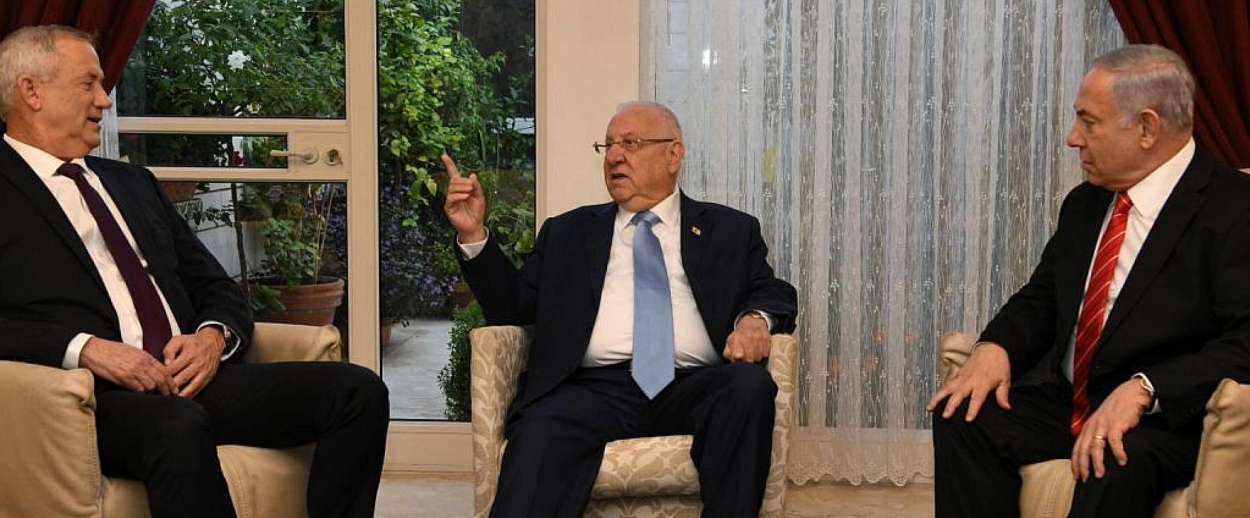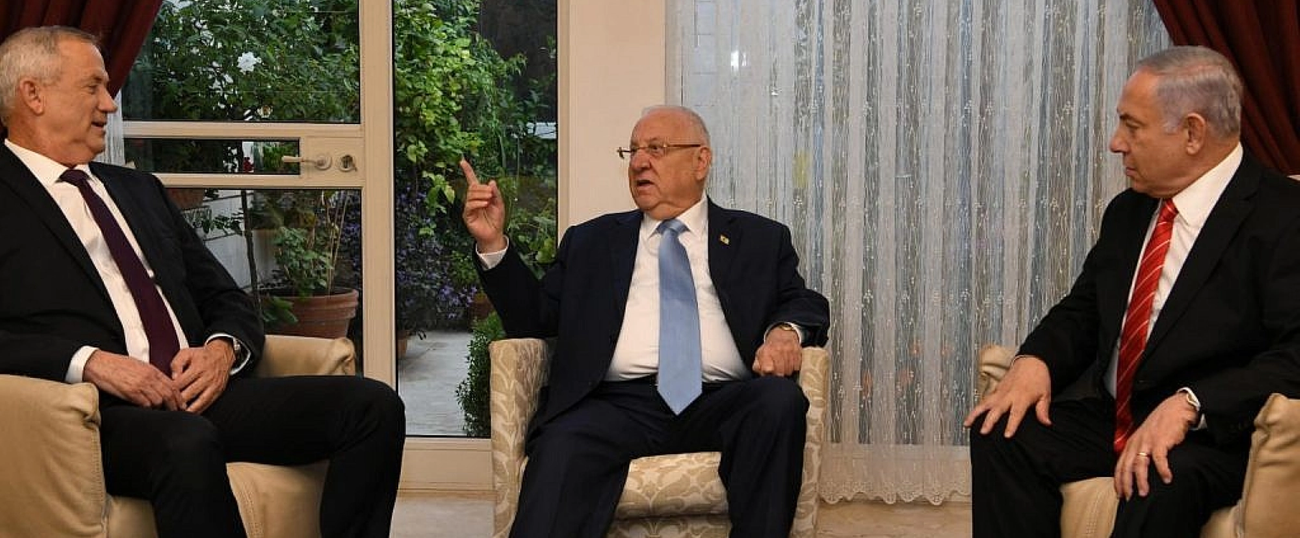Netanyahu Didn’t Lose the Election on Election Night, and He Didn’t Just Win It Now
What on earth is going on in Israeli politics right now, explained




This evening in Israel, President Reuven Rivlin officially tasked Benjamin Netanyahu with attempting to form a governing coalition. This has caused a lot of confusion among many people, some of whom thought Bibi had already lost the election, and others who seem to think that this news means he won it. Neither of these things are true. In fact, we still have no idea who won Israel’s election, and probably won’t for some time. Let me explain what’s going on.
Didn’t Netanyahu already lose this election?
No. Winning an election in a fractious parliamentary system like Israel’s is a lot more complicated than in the United States’s presidential system. For this reason, it can often take weeks before the victor is known, while the country waits to see which party leader can successfully form a coalition. Simply put, it’s not enough just to get the most votes for your party–you need to get most of the Knesset to back you. As I explained before the election:
The Israeli Knesset is comprised of 120 seats, meaning a potential prime minister must control 61 of them to govern. This generally means cobbling together a coalition of their own party and several smaller ones. Typically, after an election, Israel’s president asks the leader of each party who they recommend as prime minister, and then gives first crack at forming a coalition to whoever gets the most support. If that person fails to form a coalition, the mandate is usually returned to the president, who then anoints another option.
The method for winning an Israeli election, then, is two-fold: (1) Getting 61 seats for your bloc, (2) Being the biggest party of that bloc. The leader of that party then becomes prime minister.
Neither Netanyahu’s Likud nor Benny Gantz’s Blue & White have fulfilled both victory conditions, so neither have won. In fact, both have blocs well under the 61 seats of support needed to control the Knesset: the pro-Bibi bloc is at 55 seats, while the anti-Bibi one is at 54. Rivlin just handed Netanyahu the first chance to assemble a government because he technically had one more seat of support than his opponent.
But didn’t Gantz’s party get more votes than Netanyahu’s? Why isn’t he getting the first chance to form a coalition?
It’s complicated. Gantz’s Blue & White received 33 Knesset seats to Likud’s 32. At the same time, as noted above, Netanyahu technically has one more seat of support in the Knesset, and there is no official rule that the biggest party gets the first chance to create a coalition. In fact, in Israel’s 2009 election, when Netanyahu first began his current term in office, Tzipi Livni’s center-left Kadima actually won one more seat than Bibi’s Likud. But Israeli President Peres nonetheless gave the first shot to Netanyahu because the right had a bigger ideological bloc overall in the Knesset, and thus the best chance of forming a coalition.
The situation right now, however, is even more fraught. Likud has 32 seats and Blue & White has 33, but neither have a real path to a coalition. The pro-Bibi bloc is 55, and the anti-Bibi bloc is 54. The reason for this deadlock is that Avigdor Lieberman, leader of the nationalist Yisrael Beitenu party, has refused to endorse either side, and instead insisted that they serve together with him in a secular unity government that excludes the ultra-Orthodox parties, something that is anathema to Netanyahu. Without Leiberman’s swing vote of 8 seats, neither Netanyahu nor Gantz can get to 61.
Wait, I thought Gantz already had the bigger bloc thanks to the Arab parties?
He did, and he didn’t.
The anti-Bibi bloc’s current 54 seats is a bit of electioneering that may have been intentionally orchestrated. On September 22, Ayman Odeh, head of the Joint List alliance of predominantly Arab parties, announced that the List would recommend Benny Gantz as prime minister to President Rivlin. Initially, the Joint List said that all 13 of its seats were endorsing Gantz, even though its most extreme member Balad did not attend the meeting for the endorsement. This gave Gantz’s bloc 57 to Bibi’s 55. The next day, however, after Blue & White’s people made clear that they preferred to attempt a coalition after Bibi, the List suddenly reversed course and announced that the party’s recommendation did not include Balad, which meant it only covered 10 seats, which put Gantz at 54, one less than Bibi. There has been some speculation that this move was done in coordination with Blue & White to give Rivlin a reason to have them go second. (Update: Odeh has confirmed that he reduced the number of recommendations at Blue & White’s request, for exactly this reason.)
Huh, what is the Israeli opposition thinking? Shouldn’t they want to go first?
The opposition’s (risky) bet is that letting Netanyahu try and fail will significantly boost their own chances of success. Like last election, they are banking on the assumption that Netanyahu will fail to form a coalition, while this time, he will also have to go through his scheduled indictment hearing for corruption on October 3. By the time Blue & White gets their turn, Bibi will have both his coalition failure and indictment hanging over him, and the specter of extremely unpopular third elections looming. With lawmakers’ backs against the wall, the opposition will then have a much better chance at forming a coalition, either by getting Likud members to defect to their side, compelling Likud to depose Netanyahu, or getting the hobbled former prime minister to agree to more favorable terms.
Couldn’t this backfire?
Absolutely. Netanyahu is Israel’s most successful politician, and he is not only fighting for his political life, he may well be fighting for his freedom. (Under Israeli law, a Knesset member under indictment has to resign, but a prime minister does not.) He will promise the moon to lure any Knesset member or party who might join his government, from the center-left Labor-Gesher to the nationalist Yisrael Beiteinu.
Moreover, the opposition’s plan relies on Avigdor Lieberman, one of Israel’s most mercurial and mercenary politicians, to hold out and not cut a deal with Bibi. Last election, Lieberman did indeed refuse to cave to Netanyahu, and his refusal to join the latter’s coalition ultimately forced new elections. Blue & White hopes for a repeat performance, and if Lieberman wants to depose Bibi, his former-mentor-turned-nemesis, this will be his chance. But he might also simply use the opportunity to extort extraordinary power and positions from Netanyahu in exchange for his seats.
Given this chaos, has Israel considered adopting a simpler and more straightforward system of government, like say, the electoral college?
Not as yet.
Why do hundreds of thousands of people around the world think Israel controls global politics when they can’t even govern themselves?
Now, that’s a question even I can’t answer for you.
Yair Rosenberg is a senior writer at Tablet. Subscribe to his newsletter, listen to his music, and follow him on Twitter and Facebook.